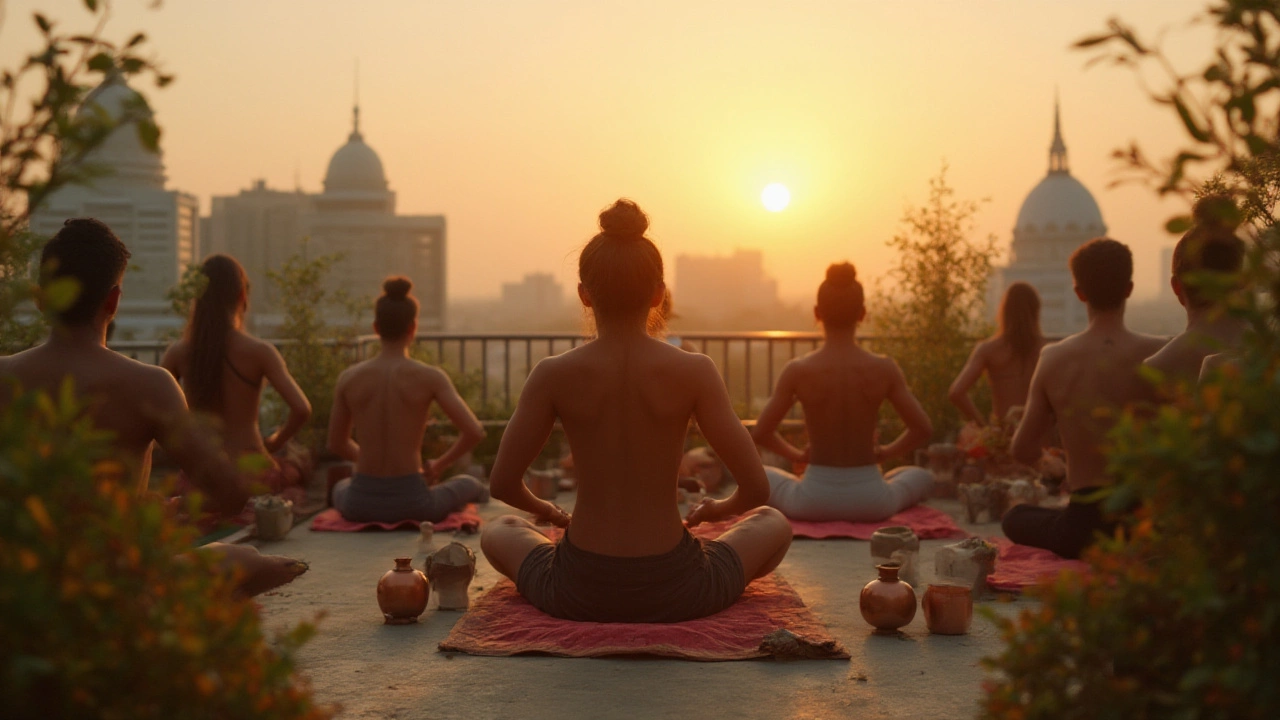Imagine waking up when the city’s still wrapped in a gentle hush, not a honk or commotion in earshot. That’s the vibe Ayurveda calls the “golden hour”—not just a poetic name, but a powerful chunk of the day that’s prized in India’s oldest health system. While most of us worry about coffee or alarm snooze buttons, ayurvedic wisdom says your first hour after dawn sets the tone for everything, from your mind’s clarity to your gut health. And no, it’s not just some ancient superstition; modern science is catching up, and those who try out a golden hour routine often swear it works wonders for energy and calmness. Let’s peel back the layers of this sunrise secret, see why it’s been hyped for centuries, and figure out if there’s actually something magical happening when you’re up with the birds.
What Exactly is the Golden Hour in Ayurveda?
The “golden hour” or “Brahma Muhurta”—literally, the ‘Creator’s Time’—sounds dramatic, but it actually just means the period roughly 1.5 hours before sunrise. It’s sort of like the early bird’s bonus level—quiet, gentle light, soft air. According to Ayurveda, this isn’t a random time, it’s considered spiritually charged and physically ideal. The ancient texts claim this is when vital energy, or prana, is at its peak. There’s a reason Indian yogis, sages, and even poets found their creative groove during these early hours.
Not convinced by spiritual talk? Here’s what’s fascinating: modern circadian biology has started echoing similar ideas. Researchers say the hours before and after sunrise mark subtle shifts in our body’s hormone production. Cortisol, the hormone that gets us going, starts to gently spike, while melatonin, the sleep hormone, fades away. It’s a biological baton pass, setting you up for alertness and focus—so if you wake up at this time, you’re syncing with your body’s natural rhythm, not working against it.
In Ayurveda, the golden hour is dominated by vata dosha, which is all about movement and subtlety—think wind, inspiration, and mobility. This makes it the perfect time for meditation, gentle yoga, intention-setting, or even just a quiet cup of herbal tea. There’s a reason you don’t see marathon runners or weightlifters pounding the pavement at 4:30 am, but you’ll find monks and yogis doing breathwork or silent reflection. The body’s in a sweet spot: digestion is soft, the mind is razor-sharp, and the senses are more attuned.
This pre-dawn slot isn’t just about feeling calmer—Ayurveda says health starts in the gut and mind, and the two are hyperlinked. Doing things right during the golden hour is said to set your agni (digestive fire) and medha (intelligence) on the right track for the day. Research on “corporate athletes” backs this up a bit: controlled, mindful early-morning routines actually boost work performance, with workers reporting less anxiety and more energy. So, while the ancient texts used different language, the idea holds up.
The spiritual aspect isn’t just for the religious. Whether you believe in higher powers or not, there’s something undeniably centering about being awake when the world’s still. It’s a natural reset button—the kind we crave after a rough week. My own son Nirvaan, who’s usually glued to screens, feels calmer and less cranky if he joins me for a few early stretches, even if he grumbles through half of it. Kids, especially, need gentle starts; Ayurveda just figured this out a few thousand years ago.

Health Benefits Linked to Ayurveda's Golden Hour
So, what does this sacred hour really do for your body and brain? First off, the light. Natural light right after dawn is packed with blue wavelengths that trigger your body’s wake-up switch, but it’s not harsh enough to jolt your system. According to a 2022 sleep study in India, people who got 15-30 minutes of sunrise exposure reported feeling less groggy, and even had steadier moods across stressful days. This matches a growing pile of evidence—morning sunlight syncs our internal clock (circadian rhythm), which impacts sleep quality, hormone balance, and immune defenses.
Ayurveda leans in hard on gut health, and the golden hour’s slow, gentle start is meant to support it. Instead of grabbing coffee and running out the door, traditional practices like sipping warm water, doing gentle stretches, or even just sitting quietly, give your digestive system time to “wake up.” In one practical Indian urban life study, people who drank lukewarm water upon waking found reduced bloating and lunchtime cravings compared to those who went straight for breakfast or caffeine blasts. That’s not magic—just letting the gut catch up before shoving food into it.
The mental benefits might actually overshadow the physical. The golden hour is primetime for meditation—something even hard-nosed neuroscientists are getting behind. MRI studies have shown that people who meditate in the early morning (before daily distractions set in) end up with more consistent reductions in brain stress markers. In Ayurveda, starting your day with a few mindful breaths is meant to calm the mental doshas—balancing vata’s restlessness and taming pitta’s impatience. Even if you don’t care about doshas, you can’t deny that using this quiet hour for peaceful reflection works better than doomscrolling.
One of the most interesting findings comes from an urban study in Mumbai, where commuters who took even 10 minutes for early-morning gratitude writing or silent sitting reported fewer “stressed-out” episodes, especially during their rush hour. The act of waking up with the sun—and not the screech of an alarm or phone—has a ripple effect. It’s not just folksy advice; sleep scientists tracking older adults found that those who woke early and got some light activity had lower rates of anxiety and better heart rate variability (a marker of cardiovascular health).
Getting practical, here’s how the golden hour habits stack up against the stuff we do in a regular morning:
| Activity | Golden Hour Routine | Typical Modern Morning |
|---|---|---|
| Wake-up cue | Natural dawn or gentle alarm | Loud alarm, rushed wake-up |
| First drink | Warm water or herbal tea | Coffee or cold juice |
| Movement | Gentle stretches, yoga, walking | Rushed, little movement |
| Mental state | Mindfulness, meditation | Checking phone/emails |
| Digestion | Starts slowly, boosts later digestion | Immediate heavy meal or no breakfast |
There’s nuance in Ayurveda, though. This isn’t a one-size-fits-all rule. People with chronic insomnia, kids under 10, or folks needing midnight work shifts can tweak the golden hour to their lives. The main thing is to find a pocket of quiet time, ideally before the busyness starts, and stick with it. Once you get used to it, you might find your cravings, focus, and mood shifting for the better—almost like your body was waiting to operate on its “factory settings.”

Ayurvedic Golden Hour Tips: Small Habits, Big Results
All this wisdom sounds nice, but how do you make it work if you have school runs, commutes, or a partner who’s allergic to mornings? The trick: start ridiculously small. Ayurveda’s golden hour isn’t about strict rituals or complicated routines. At its core, it’s about showing up for yourself, even if just for 5 or 10 minutes. Here’s what has actually worked in my own home, and in families juggling real, messy lives.
- Set your alarm just 10-15 minutes earlier than usual. No need for 4 am heroics.
- Don’t check your phone for the first 20 minutes after waking, if possible. Let your brain settle before the digital floodgates open.
- Drink a glass of warm water as soon as you wake up. It’s shockingly effective in jumpstarting digestion; my own stomach protests if I skip this now.
- If meditation sounds intimidating, try three-minute breathing: inhale slow, exhale slower, and repeat. Or just look out your window at the sunrise colors—Ayurveda says even watching gentle morning light stimulates the pineal gland and balances melatonin.
- Do some basic movements: gentle neck rolls, slow child’s pose, even walking barefoot outside if you can (Ayurveda calls it “earthing”; modern research says it really does help with stress).
- Avoid heavy or processed foods until at least an hour after waking. Traditional gujarati grandmas had it right: plain moong dal soup or spiced warm water beats a sugary croissant when your stomach’s just waking up.
- If you can squeeze it in, jot down an intention for the day or three things you’re grateful for. Sounds cheesy, but studies on gratitude journaling show it actually does lower cortisol over a few weeks.
- For those who like routine, Ayurveda suggests dedicating one small ritual: oil pulling, tongue scraping, or even five sun salutations can set the rhythm for your gut and mind to follow.
- If you have kids, let them be part of the ritual. Nirvaan’s favorite is “sun salutations challenge”: see who can stretch longest before giggling. It becomes a moment, not a chore.
- Can’t make sunrise? Find your own “golden hour.” Maybe it’s late evening, after work, when the house is calm. Ayurveda keeps the principle flexible—what matters is intention and repetition.
If you’re curious which parts to start with, here’s a popular Ayurvedic golden hour morning sequence:
- Wake up with or just before sunrise.
- Sit up in bed, rub your palms together, and place them over your eyes—supposed to ‘charge’ them with energy, not just spiritual fluff but a gentle wake-up for your optic nerves.
- Drink warm water, maybe infused with lemon or ginger.
- Empty your bladder and bowels—Ayurveda claims elimination at dawn prevents buildup of “ama” (toxins).
- Sit in quiet meditation, focusing on breath or a simple mantra. If nothing else, just be still.
- Do gentle stretches or yoga, focusing on slow movements and joint rotations.
- If you’re up for it, take a short walk outside—barefoot on grass if possible (those ‘barefoot parks’ in big cities are inspired directly by this tradition).
- Keep breakfast light and warm—think oats, bananas, or lightly spiced porridge.
- Start work or school tasks only after this mini-ritual; you’ll notice sharper focus, less tension.
The golden hour in Ayurveda isn’t a secret club for monks or minimalists. It’s about nudging your day onto a calm, energized track—no mysticism needed. Most people, once they try it for two weeks, see enough difference to make it a habit for life. If you want to test something ancient and proven (and feel just a bit more alive in the morning), this is maybe the simplest hack you could try. Sunrise never looked so good.






